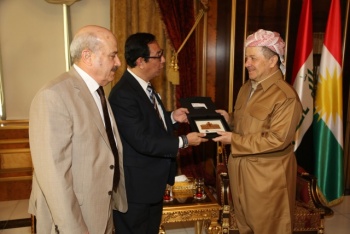Education for all is a universal right
Professor Tan Sri Dato' Dzulkifli Abdul Razak
My View - The Sun Daily
May 11, 2016
LAST week, as I stepped into the city of Erbil, the capital of Kurdistan Region of Iraq, angry protesters broke into Baghdad's Green Zone, a highly fortified exclusive area.
This incident, coming just after the storming of the Iraqi parliament, created uncertainties. Security has always been of grave concern in Baghdad, the scene of so much killing, that it becomes a major consideration in the decision to visit the country.
Most people intending to visit Iraq are unable to figure out what is the real state of affairs, let alone understand what it is about. On that day, adding to the confusion was that it was the fifth anniversary of the raid that took the life of Osama bin Laden in Pakistan.

| Dzulkifli pays a courtesy call on the president of the Iraqi Kurdistan Region, Masoud Barzani (R). Prof Mosleh Duhoky , president of the University of Duhok, is at left. |
It did not matter that Erbil was 400km away from the scene of tension and that travel by road takes almost five hours. Travelling to war-torn zones can be very unsettling because of the many gaps of information and the "ignorance" associated with specific locations. This definitely was the situation that I found myself in when I was invited as president of the International Association of Universities to visit the University of Duhok.
The university is 150km west of Erbil, which meant three hours of travel on a well-paved expressway.
The university president, Prof Mosleh Duhoky, who was behind the invitation, was insistent that Duhok and Kurdistan on the whole, is "the most peaceful area in Iraq".
Although Mosul, the other troubled city familiar to many, is about 75km south of Duhok, the university was in no way affected, neither was the city, nor the region as such. It was calm and everyone went about their chores.
Duhok is not just peaceful, it is also clean and serene; surrounded by mountains it exudes a sense of "natural" protection as it were.
Due to this, it holds a strategic position. With a population of barely 350,000 people, it seems to project a promising future bolstered by at least three universities offering learning opportunities in the region.
The University of Duhok, the oldest, was established in 1992, a year after the so-called First Gulf War, following a resolution by the Parliament of the Kurdistan Regional Government to address the increasing demand for higher education in the region.
It was also a swift reaction to the alleged "denial" of Kurdish students to enrol in other Iraqi universities.
Kurdistan's first and only university then, Salahaddin University in Erbil, was already bursting at the seams.
Its remote location compounded by the wholesale UN economic embargo provided compelling reasons for another university.
More than a decade later, the university stands proud to have survived the trying times, and is poised to move forward internationally as the country's premier institution.
More recently, the American University of Kurdistan, a private not-for-profit institution, was established in Duhok with a liberal arts orientation, alongside another private entity, University of Nawroz, which was initially set up as Duhok University College when it was founded in 2004 by the Syndicate of Economists in Duhok Governorate.
Yet Kurdistan and its universities, like in many areas destabilised by wars and calamities, are confronted by unique challenges arising from "unfair" global public perception.
Consequently, they remain relatively "isolated" from the vibrant academic changes that are taking place.
This hampers the country's ability to cope, drawing it away from the set national trajectory.
In reality, the aspirations of education as the leveller of society, and the global tide that carries all boats failed to be actualised.
The impact of this reality has come more forcefully to me after the visit to Kurdistan, Duhok in particular, and after engaging with the various leaders in trying to fathom the complexities that seem to have turned education into a "victim" of unjust circumstances.
It is here that universities worldwide must join forces in bringing home the vital message that education for all is a basic human right.
Those privileged to secure this right must ensure that others benefit from it as well. This is a cause that goes beyond the tired clichés of globalisation and internationalisation. It is fundamentally about humanity, which to begin with, gave birth to the real ethos of education. And in this context, Kurdistan must no longer be deprived its rightful place in the sun.
